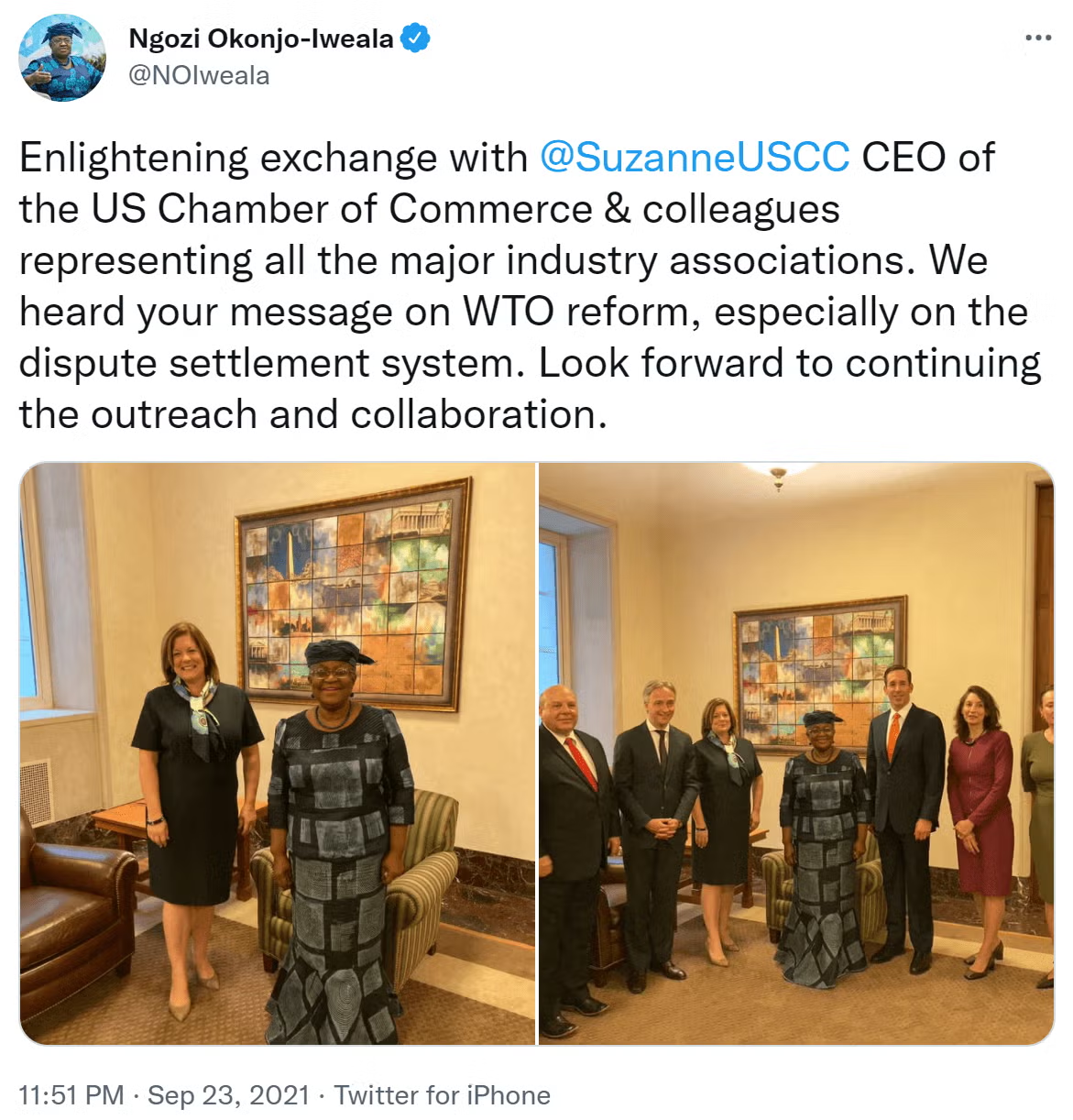Amid growing reports of supply chain bottlenecks and shortages, U.S. Trade Representative, Katherine Tai, made a timely visit to Geneva this week to affirm the Biden Administration’s support for the World Trade Organization (WTO) ahead the Twelfth WTO Ministerial Conference later this winter.
Bloomberg’s Bryce Baschuk reports that Ambassador Tai and the Biden Administration believe the WTO can be a “force for good that encourages a race to the top and addresses global challenges as they arise.”
The American Chemistry Council (ACC) and our partners in the International Council of Chemical Associations (ICCA), the voice of the global chemicals industry, could not agree more with USTR Tai’s assessment of the WTO’s untapped potential.
Chemicals as a Catalyst for WTO Reform
In September of this year, ICCA, a long-time supporter of the WTO, published a position paper outlining a path forward for modernization. This paper has sparked discussion at a number of important trade meetings and events over the last few months, prior to USTR Tai’s visit to Geneva this week.
On September 13, ICCA partnered with the International Chamber of Commerce (ICC) to host a virtual launch event in which the industry announced that it had coalesced around a set of recommendations – based on concrete, practical solutions –that could help drive the conversation forward on WTO reform.
The Director General of the WTO, Dr. Ngozi Okonjo-Iweala, reportedly cited the ICCA paper during a meeting in Washington, DC with several business leaders, including Chris Jahn, president and CEO of ACC, one of the leading members of ICCA.

The meeting followed on the heels of a September 14 letter from ICCA to Dr. Okonjo-Iweala recognizing her leadership at the WTO and potential opportunities to restore leadership on critical trade issues.
Encouraged by the support for ICCA’s WTO reform position paper, we brought our recommendations to the 2021 WTO Public Forum in Geneva, where I moderated a hybrid panel discussion featuring delegates from around the ICCA world and other trade experts that have endorsed our recommendations.
Entitled “Chemicals as a Catalyst for WTO Reform,” the Public Forum discussion homed in on restoring the WTO’s leadership, improving current functions, and advancing critical negotiations on emerging trade issues such as regulatory cooperation and environmental sustainability. The ICCA delegation also met with a range of WTO Ambassadors, country representatives, and staff from the WTO Secretariat to present their perspectives.
Following the WTO Public Forum Session, the Organization of Women in International Trade (OWIT) and the Association of Women in International Trade (WIIT)hosted a conversation about the outcomes of the public forum and how women in international trade can play a key role in leading on the path to WTO reform.
Summarizing the ICCA Paper and Session on WTO Reform
New Negotiating Agenda
The ICCA position paper contains three recommendations on a new negotiating agenda, which cover 1) trade and environmental sustainability, 2) regulatory cooperation, and 3) new rules on subsidies and state-owned enterprises (SOEs).
Our interlocutors were most interested in the first topic, given the new Trade and Environmental Sustainability Structured Discussions (TESSD) and the Informal Dialogue on Plastics Pollution and Environmentally Sustainable Plastics Trade (IDP). They also expressed interest in the WTO doing more on regulatory cooperation as a concrete means for preventing barriers to trade.
Institutional Reform
ICCA’s six recommendations in this area were seen as common sense and topics already under discussion: (1) fix the WTO dispute settlement process; 2) support plurilateral initiatives; 3) enhance stakeholder engagement; 4) make trade-related measures more transparent; 5) fully implement the WTO Agreement on Technical Barriers to Trade; and 6) review and improve WTO institutional performance
Most interlocutors welcomed business support and engagement for the WTO. The most discussed recommendation concerned “enhanced stakeholder engagement,” with some delegations noting that, unlike the OECD or APEC, the WTO does not have a formal mechanism to consult with stakeholders.
Current Negotiating Opportunities
The ICCA recommendations in this area focus on three ongoing negotiations: investment facilitation, digital trade/e-commerce, and tariffs. Of the three, ICCA spent more time on digital trade and e-commerce with interlocutors, who welcomed the interest of a traditional industry in these negotiations. The digital trade negotiators may benefit from practical examples on how chemical manufacturers are using digital technologies to advance their businesses.
Looking ahead to MC12
ICCA will continue to be a stalwart supporter of the rules-based multilateral trading system under the leadership of the WTO. Our delegation will return to Geneva for the Twelfth Ministerial Conference at the end of November to reaffirm our commitment to work with the Director General to drive a concrete, practical reform agenda forward, in concert and coordination with the WTO membership.
I’ll look forward sharing my notes and takeaways with you following MC12.


